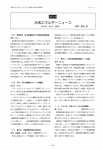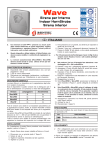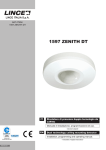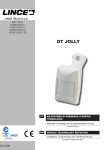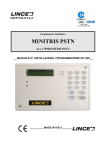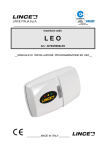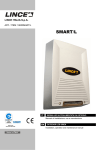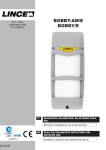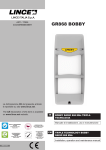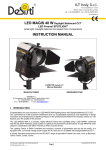Download File istruzioni
Transcript
LINCE ITALIA S.p.A. NEMO-I ART. / ITEM: 1812NEMO-I LINCE ITALIA S.p.A. Via Variante di Cancelliera, snc 00040 ARICCIA (Roma) Tel. +39 06 9301801 Fax +39 06 930180232 [email protected] www.lince.net NEMO-L ART. / ITEM: 1813NEMO-L 001530/00767AB REG.N.4796 UNI EN ISO 9001:2008 IT SIRENA PIEZOELETTRICA PER INTERNO Manuale di installazione, uso e manutenzione EN INDOOR PIEZOELECTRIC SIREN Installation, operation and maintenance manual - Istruzioni originali - - Translation of the original instructions (original instructions in Italian) - Le informazioni riportate in questo manuale sono state compilate con cura, tuttavia LINCE ITALIA S.p.A. non può essere ritenuta responsabile per eventuali errori e/o omissioni. LINCE ITALIA S.p.A. si riserva il diritto di apportare in ogni momento e senza preavviso, miglioramenti e/o modifiche ai prodotti descritti nel presente manuale. Consultare il sito www.lince.net per le condizioni di assistenza e garanzia. LINCE ITALIA S.p.A. pone particolare attenzione al rispetto dell'ambiente. Tutti i prodotti ed i processi produttivi sono progettati con criteri di eco-compatibilità. The information in this manual has been issued with care, but LINCE ITALIA S.p.A. will not be responsible for any errors or omissions. LINCE ITALIA S.p.A. reserves the right to improve or modify the products described in this manual at any time and without advance notice. Terms and conditions regarding assistance and the product warranty can be found at LINCE ITALIA's website www.lince.net. LINCE ITALIA S.p.A. makes it a priority to respect the environment. All products and production processes are designed to be eco-friendly and sustainable. 1. 1. INTRODUZIONE Il manuale descrive le modalità di installazione e uso delle sirene piezoelettriche da interno 1812NEMO-I e 1813NEMO-L. La sirena è il principale dispositivo di segnalazione degli allarmi nei sistemi di sicurezza a cui deve essere dato un alto grado di sicurezza e di affidabilità nel tempo. 1.1 CARATTERISTICHE GENERALI La sirena è disponibile in due versioni che si distinguono per il tipo di alimentazione e la presenza o meno del lampeggiatore: NEMO-I NEMO-L Lampeggiatore No Si Autoalimentata No Si INTRODUCTION The manual describes the operating and installation methods of the 1812NEMO-I and 1813NEMO-L indoor piezoelectric sirens. The siren is the main alarm signalling device in security systems and must be equipped with high level security and reliability over time. 1.1 GENERAL FEATURES The siren is available in two versions that are distinguished by the type of power and the presence of the flashing light: NEMO-I NEMO-L Flashing light No Yes Self-powered No Yes Tutte le versioni sono dotate: – di un trasduttore piezoelettrico per la segnalazione acustica; – di un dispositivo antisabotaggio che segnala la rimozione del coperchio e/o lo strappo dal muro. La versione NEMO-L è dotata di LED per la segnalazione ottica ed, inoltre, di una batteria tampone che ne garantisce il funzionamento anche in assenza di alimentazione. All versions are equipped with: – a piezoelectric transducer for acoustic signalling; – an anti-tamper device that indicates the removal of the lid and/or the removal from the wall. The NEMO-L version is equipped with LEDs for visual indication, and a backup battery that guarantees operation even in the event of a power cut. 1.2 1.2 CARATTERISTICHE TECNICHE Alimentazione Assorbimento in allarme Pressione sonora Grado di protezione Temperatura di funzionamento Dimensioni esterne (LxAxP) Peso (senza batteria) Batteria tampone NEMO-I NEMO-L Made in PRC Made in Italy NEMO-I / NEMO-L NEMO-I NEMO-L 13,8 Vcc 13,8 Vcc Power TECHNICAL FEATURES NEMO-I NEMO-L 13,8 Vdc 13,8 Vdc 180 mA (max) 225 mA Power usage in alarm mode 120 mA (max) 225 mA 100 ±3 dB a 1 m 100 ±3 dB a 1 m Acoustic alarm sound level 100 ±3 dB at 1 m 100 ±3 dB at 1 m IP 31 IP 31 IP 31 IP 31 +10 °C / +40 °C +10 °C / +40 °C 155 x 136 x 38 mm 155 x 136 x 38 mm 180 g (max) 180 g (max) - 1/3AA 300 mAh 7,2 V Protection level Operating temperature External dimensions (WxHxD) Weight (no battery) Buffer battery NEMO-I NEMO-L +10 °C / +40 °C +10 °C / +40 °C 155 x 136 x 38 mm 155 x 136 x 38 mm 180 g (max) 180 g (max) - 1/3AA 300 mAh 7,2 V Made in PRC Made in Italy 1 LINCE ITALIA S.p.A. 2. INSTALLAZIONE 2. INSTALLATION 2.1 DOTAZIONI DI SERIE 2.1 STANDARD EQUIPMENT Fare riferimento alla fig. 1 per l'identificazione delle dotazioni di serie. 2.2 INSTALLAZIONE A PARETE Refer to fig. 1 to identify the standard equipment. 2.2 WALL INSTALLATION Le seguenti operazioni devono essere effettuate da personale qualificato e specializzato. Prima dell'installazione verificare le seguenti condizioni: • la sirena deve essere installata all'interno dei locali; • la parete non deve presentare avvallamenti o sporgenze eccessive per non compromettere il funzionamento del dispositivo antistrappo. • Nell'effettuare i fori per il fissaggio, fare attenzione a non danneggiare fili o tubi sotto traccia. The following operations must be carried out by qualified and specialist personnel. Before starting the installation, make sure that: • the siren should be installed indoors; • the wall does not have any pronounced depressions or protrusions: these can prevent the wall tamper device from operating correctly. • When drilling the mounting holes, be careful not to damage concealed wires or pipes. Fasi di installazione • Svitare e rimuovere una delle due viti 3 (fig. 1) ed aprire il coperchio 2. • Posizionare il fondo della sirena sulla parete e tracciare i fori di riferimento, di cui: segnare una traccia nel foro F1 (in basso a destra per attivare la funzione antistrappo) ed un'altra scegliendone uno dei fori F2 (fig. 2). • Sulla parete praticare i 2 fori utilizzando un utensile adeguato ed installare i tasselli (in dotazione). Verificare, inoltre, che il tassello in basso a destra (antistrappo) sia correttamente fissato. • I due fori centrali FB (fig. 2) sono predisposti per l'installazione della sirena su una scatola elettrica da incasso; in questo caso segnare una traccia nel foro F1 (in basso a destra per attivare la funzione antistrappo) ed un'altra scegliendo uno dei fori FB. • Passare il cavo per i collegamenti attraverso i fori 8 (pretagli) posti sul fondo (fig. 2). • Una volta inseriti i tasselli nel muro, posizionare la sirena sulla parete e fissare con le due viti (in dotazione). • Impostare il tipo di suono desiderato come indicato al par. 2.3. • Procedere con il collegamento elettrico come descritto al par. 2.4. • Solo mod. NEMO-L: posizionare la batteria tampone nel suo alloggiamento (rif. 9, fig. 2) ed effettuare il collegamento come indicato al par. 2.4. • Ad operazioni concluse: chiudere il coperchio, posizionare nel suo alloggiamento la vite 3 precedentemente rimossa ed avvitarla fino al completo fissaggio. Installation steps • Loosen and remove one of the 2 screws (ref. 3, fig. 1) and open the lid (2). • Place the backplate of the siren on the wall and mark the reference holes: mark the F1 hole (lower right to activate the wall tamper function) and another by choosing one of the F2 holes (see fig. 2). • Make 2 holes in the wall using an appropriate tool and insert the plugs (supplied). Check that the bottom right plug (wall tamper) is fastened correctly. • The two central FB holes (fig. 2) are set-up for the siren to be installed on a recessed electrical box; in this case, mark the F1 hole (lower right to activate the wall tamper function) and another by choosing one of the FB holes. • Pass the connection cable through the holes (ref. 8, pre-cut) on the backplate (fig. 2). • Once the plugs are inserted into the wall, place the siren on the wall and fasten it with the 2 screws (supplied). • Set the type of desired acoustic alarm as described in par. 2.3. • Set up the electrical connection as described in par. 2.4. • Only mod. NEMO-L: place the backup battery in its housing (ref. 9, fig. 2) and connect as described in par. 2.4. • Once completed: close the lid, place the previously removed screw (3) in its housing and tighten it until it is securely fastened. 2.3 IMPOSTAZIONE DEL TIPO DI SUONO 2.3 La sirena può emettere due diversi tipi di suoni in base alla posizione del ponticello J1. J1 J1 2.4 TIPO DI SUONO COLLEGAMENTO ELETTRICO Per i collegamenti usare sempre cavi schermati con un capo dello schermo collegato alla massa della centrale e l'altro, quello verso la sirena, lasciato libero. Se i collegamenti sono molto lunghi verificare che non vi sia caduta di tensione. Descrizione dei morsetti per il collegamento (fig. 3, 4, 5) Su questo morsetto è presente una tensione continua di 13,8 V. Two-tone 2.4 Description of the connection terminal blocks (fig. 3, 4, 5) There is a direct current at 13.8 V on this terminal block. NEMO-L Power: 13,8 Vdc / 25 mA (max) 12V +N / -A AS Ingresso di controllo NEMO-I La sirena è nello stato di riposo quando il morsetto 12 V è appeso; la sirena si attiva quando il morsetto 12 V è collegato al positivo (13,8 V). Ingresso di controllo NEMO-L La sirena è nello stato di riposo quando il morsetto +N è collegato al positivo (13,8 V) ed il morsetto -A è collegato alla massa. La sirena si attiva quando i morsetti +N o -A restano appesi. Antisabotaggio. I morsetti AS sono collegati fra loro quando il microswitch 6 (fig. 2) è chiuso; sono scollegati fra loro quando il microswitch 6 è aperto. ELECTRICAL CONNECTION Always use shielded cables for the connections, with one end of the shield connected to the ground of the control unit and the other, which goes towards the siren, left free. If the connections are very long, check that there is no power loss. Alimentazione NEMO-L: 13,8 Vcc / 25 mA (max) 12V TYPE OF ACOUSTIC ALARM Up and down (default) modulation Modulazione in salita e discesa (default) Bitono SETTING THE TYPE OF ACOUSTIC ALARM The siren can emit two different types of acoustic alarm according to the position of jumper J1. NEMO-I control input The siren is in the idle state when the 12 V terminal block is open; the siren is activated when the 12 V terminal block is connected to the positive (13.8 V). +N / -A NEMO-L control input The siren is in the idle state when the +N terminal block is connected to the positive (13.8 V) and the -A terminal block is connected to the ground. The siren is activated when the +N or -A terminal blocks remain open. AS Anti-tamper. The AS terminal blocks are interconnected when micro switch 6 (fig. 2) is closed; and disconnected when micro switch 6 is open. Power supply negative (ground). Negativo di alimentazione (massa). 2 NEMO-I / NEMO-L LINCE ITALIA S.p.A. 2.4.1 Collegamento elettrico NEMO-I Eseguire le seguenti operazioni (fig. 3): 1. collegare il morsetto 12V ad un positivo presente in centrale in fase di allarme e il morsetto ( ) alla massa; 2. collegare il morsetto AS alla linea antisabotaggio di una centrale di allarme. 2.4.1 NEMO-I electrical connection Perform the following operations (fig. 3): 1. connect the 12V terminal block to a positive signal when the alarm is setted and the ( ) terminal block to the ground; 2. connect the AS terminal block to the anti-tamper line of an alarm control panel. 2.4.2 2.4.2 Collegamento elettrico NEMO-L NEMO-L electrical connection • PROCEDURA DI COLLEGAMENTO TRAMITE MORSETTO: +N Eseguire le seguenti operazioni (fig. 4): 1. rimuovere il ponticello J3; 2. collegare il morsetto -A alla massa ( ); 3. collegare l'alimentazione al morsetto 12V ed alla massa ( ) rispettandone la polarità (+ / -); 4. collegare il morsetto AS alla linea antisabotaggio di una centrale di allarme. • CONNECTION PROCEDURE VIA TERMINAL BLOCK: +N Perform the following operations (fig. 4): 1. remove the jumper J3; 2. connect the terminal block -A to the ground ( ); 3. connect the power supply to the 12V terminal block and the ground ( ) with the correct polarity (+ / -); 4. connect the AS terminal block to the anti-tamper line of an alarm control panel. • PROCEDURA DI COLLEGAMENTO TRAMITE MORSETTO: -A Eseguire le seguenti operazioni (fig. 5): 1. inserire il ponticello J3; 2. collegare l'alimentazione al morsetto 12V ed alla massa ( ) rispettandone la polarità (+ / -); 3. Collegare il morsetto AS alla linea antisabotaggio di una centrale di allarme. • CONNECTION PROCEDURE VIA TERMINAL BLOCK: -A Perform the following operations (fig. 5): 1. insert the jumper J3; 2. connect the power supply to the 12V terminal block and the ground ( ) with the correct polarity (+ / -); 3. Connect the AS terminal block to the anti-tamper line of an alarm control panel. 2.5 2.5 SEGNALAZIONI DELLA SIRENA 2.5.1 Allarmi La segnalazione della condizione di allarme avviene per mezzo di un suono modulato in frequenza (tutti i modelli) e di un lampeggiatore (solo mod. NEMO-L). Per rispondere alle normative vigenti, la segnalazione acustica dura al massimo 5 minuti, mentre quella ottica permane fino a quando non vengono ripristinate le condizioni di normale funzionamento. 3. MANUTENZIONE E VERIFICHE PERIODICHE 3.1 CONTROLLO E SOSTITUZIONE DELLA BATTERIA Solo mod. NEMO-L. La batteria garantisce l'alimentazione in caso di mancanza di rete elettrica. Si consiglia di controllare periodicamente l'efficienza della batteria della sirena e provvedere alla sostituzione ogni 3 anni. Materiale da utilizzare: cacciavite - batteria nuova. Procedura di sostituzione: 1. Svitare e rimuovere una delle due viti 3 (fig. 1) ed aprire il coperchio 2. 2. Rimuovere il ponticello JP2 della batteria (rif. 9, fig. 2) e rimuoverla dal suo alloggiamento. 3. Installare la nuova batteria ponendo attenzione alla polarità. Nota: la batteria nuova deve avere caratteristiche uguali all'originale. 4. Inserire il ponticello JP2. 5.2 PULIZIA DELLA SIRENA Periodicità: quando necessario o in condizione di sporcizia evidente. Materiale da utilizzare: panno - acqua senza additivi. Procedura di pulizia: ATTENZIONE! Per rimuovere sporcizie particolarmente evidenti NON utilizzare prodotti a base di cloro, prodotti abrasivi oppure alcool. 1. 2. Pulire il coperchio con un panno inumidito con sola acqua. Ripassare con un panno asciutto. NEMO-I / NEMO-L SIREN ALERTS 2.5.1 Alarms The signalling of the alarm occurs by means of a frequency modulated acoustic alarm (all models) and a flashing light (only mod. NEMO-L). To comply with current regulations, the acoustic alarm lasts a maximum of 5 minutes. The flashing light, however, continues until normal operation is restored. 3. MAINTENANCE AND PERIODIC CHECKS 3.1 CHECKING AND REPLACING THE BATTERY Only mod. NEMO-L. The battery guarantees power in the event of a blackout. It is recommended to periodically check the efficiency of the siren's battery, which must be replaced every 3 years. Material to be used: screwdriver - new battery. Replacement procedure: 1. Loosen and remove one of the 2 screws (ref. 3, fig. 1) and open the lid (2). 2. Remove the jumper JP2 of the battery (ref. 9, fig. 2) and remove it from its housing. 3. Install the new battery paying attention to its polarity. Note: the new battery must have the same characteristics as the original one. 4. Insert the jumper JP2. 5.2 CLEANING THE SIREN Frequency: when necessary or when clearly dirty. Material to be used: cloth - water with no additives. Cleaning procedure: IMPORTANT! Do NOT use chlorine-based or abrasive products or alcohol to remove particularly noticeable dirt. 1. 2. Clean the lid with a damp cloth with clear water. Wipe with a dry cloth. 3 LINCE ITALIA S.p.A. 4 4 10 9 5 12 7 6 11 3 2 1 3 Fig. 1 – Componenti generali e dotazioni di serie / General components and standard equipment LEGENDA: 1 Coperchio flash 2 Coperchio 3 Viti chiusura 4 Dadi di serraggio 5 Morsettiera 6 Microswitch (antiapertura / antistrappo) 7 Scheda elettronica 8 Parti pretagliate per passaggio cavi 9 Vano batteria tampone 10 Fondo 11 Kit elementi di fissaggio (in dotazione) 12 Manuale (in dotazione) F2 F2 8 10 5 9 KEY: 1 Flash lid 2 Lid 3 Fastening screws 4 Clamping nuts 5 Terminal block 6 Micro switch (anti-opening / wall tamper) 7 Electronic board 8 Pre-cut parts to allow the cable to pass through 9 Backup battery compartment 10 Backplate 11 Fastening components kit (supplied) 12 Manual (supplied) 8 Sirena / Siren 7 Centrale / Control panel 8 5 FB FB 8 F2 F1 6 Fig. 2 - Particolare del fondo / Detail of the backplate Fig. 4 - Collegamento NEMO-L (+N) / NEMO-L (+N) connection Sirena / Siren Sirena / Siren Centrale / Control panel 5 Centrale / Control panel 5 5 Fig. 3 - Collegamento NEMO-I / NEMO-I connection 4 Fig. 5 - Collegamento NEMO-L (-A) / NEMO-L (-A) connection NEMO-I / NEMO-L





